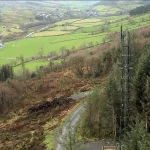Broadband Forum Seeks More Energy Efficient Full Fibre Networks

The Broadband Forum has launched a new project that is seeking to lower the energy consumption of fibre optic broadband networks when accessing the internet. This will build on the ITU-T’s recommendations and guidelines on power-saving in fibre equipment, while adopting some of the forum’s own standards.
First things first. Modern fibre optic networks are already highly energy efficient, particularly when compared with older copper-line technologies at similar speeds. But this sort of comparison will only get you so far because full fibre networks typically deliver significant faster speeds than those older technologies. Nevertheless, there’s always room for more improvement.
The project – ‘Energy Power Saving Requirements, Test Plan, and Data Model‘ – will see a number of the Broadband Forum’s standards and specifications incorporate these new energy saving requirements for the industry to adhere to. This builds on the ITU-T Supplement 45 (G series), which published recommendations and guidelines on power-saving in Passive Optical Networks (PON) equipment.
Advertisement
The main focus here will be on making improvements to Optical Line Terminals (OLTs) and the more familiar Optical Network Units (ONU / ONTs), which are the optical modems that FTTP broadband consumers often have to get installed inside their homes. For example, future ONUs will probably see more power shedding (i.e. reducing power to non-essential functions without breaking the optical link) and add watchful speed modes to ensure that only the relevant hardware is consuming power.
Hugues Le Bras, Network Engineer (Orange) and Project Editor, said:
“Energy efficiency in fixed broadband equipment is essential for reducing power costs and CO2 emissions for operators and their customers. As the demand for high-speed connectivity continues to rise, it becomes crucial that FTTH networks operate sustainably, ensuring connectivity empowers the end user as well as nurturing the planet. To achieve this, the new project outlines power saving requirements, power measurement monitoring and testing methods that are needed to unlock greater energy efficiency.
We need service providers to commit to lower energy consumption, equipment and component vendors to comply to these targets, and test labs to test the interoperability and functionality of protocol specific power saving methodologies once agreed on.”
Assuming all goes to plan, the project will aim to publish its specification during Summer 2025. The focus will then switch to encouraging the development of technologies that satisfy the new power-saving requirements.
Mark is a professional technology writer, IT consultant and computer engineer from Dorset (England), he also founded ISPreview in 1999 and enjoys analysing the latest telecoms and broadband developments. Find me on X (Twitter), Mastodon, Facebook, BlueSky, Threads.net and Linkedin.
« Northern Ireland Ministers Call for Improvements to Rural Mobile Coverage






















































More woke nonsense, personally I can’t wait for the day we get Saharan temperatures in London and I can dip my feet into the warm waters of the Channel from the balcony of my 20th floor apartment block in Ealing.
On a more serious comment. Operators are probably more interested in the cost savings that reduced electricity consumption brings.
Parody poster? Has to be!
Good move. The core technology is ‘settled’ now, and we’re almost all going to be on PON-type fibre networks for many years to come, with gradually increasing speeds. So let’s make the universal kit as efficient as possible: OLTs, ONTs, plus routers and everything else. For now it’s all theoretical for me, though, as I’m still in a fibre desert.
CityFibre just restarted construction in your city.
Thanks for the update – I saw some activity on the BIDB map, though I can’t find any formal announcement from them. I guess they will gradually start progress towards the northern and eastern areas that are currently becalmed, so perhaps I can hope for something by late next year….
I know it is out of their scope, but maybe we should be more bothered about the amount of energy all this AI rubbish is using.
“out of their scope”. With just three months to go you’re in the lead for the understatement of the year prize.
Why? They are not using the socket in my home
This communist mentality of scarcity is why europe is becoming poor. In fact, dumb regulations, expensive energy and punishing taxation pretty much pushed leading tech sectors like AI, data centers, semi conductors, blockchain, etc to US and Asia
Energy drives human development
News to the datacentre operators building in the UK.
You know where the airport is. You’re always complaining about how bad the UK is so do the free market thing and take your human capital elsewhere. You presumably have valuable skills and contribute a lot to the tax base given your endless complaints about tax rates so would be welcomed elsewhere.
People should look at the amount of energy these data centres are using just for AI alone, if people are bothered about the environment then this is what should be looked at.
Need to be more sustainable.
https://www.nature.com/articles/d41586-024-00478-x
Also article saying that AI is helping the environment or will help it.
https://www.nature.com/articles/s41467-019-14108-y
But if you lot don’t care, why should I?